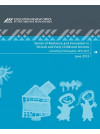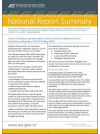This national report gives an insight into what Canterbury schools and early childhood services experienced during and after the earthquakes. It tells their stories and gives good advice about emergency planning for others in the education sector.
Methodology
During schools’ and early childhood services’ education reviews conducted between January and August 2012, ERO asked if people would like to share information about how they had responded to the earthquakes since September 2010. Boards, early childhood service managers, school leaders and teachers were invited to tell their stories in any way they chose. Information was collected from 17 schools and 27 early childhood services. This report includes extracts from some of their stories.
The information collected included:
- self-review reports from schools and services
- PowerPoint presentations
- learning stories/assessment records from early childhood services
- interview notes from discussions with staff, students and trustees.
The stories recounted the ways that:
- emergency procedures had operated and been adapted in response to the situation
- staff had supported children’s wellbeing and learning
- managers had supported staff and families.
Information was also gathered from discussions with school and early childhood associations, principals’ associations, and the wider education sector. Reports and articles were also referred to from, for example, from the PPTA journal, New Zealand Principal magazine, research reports, Canterbury Earthquake Recovery Authority (CERA), the Ministry of Education, and Kidsfirst Kindergartens’ special earthquake issue.
Evaluation framework
When a school or service identified innovative or significant examples of practices they wanted to share, ERO used the following questions to guide their story:
- How well did your crisis management processes perform during and after the crisis?
- What innovations were particularly effective?
- What would you do differently next time?
Reviewers recorded the information under the following headings:
- Context/description of situation
- Things that worked well as a result of crisis management systems
- Improvements made or advice (learning) to share with other schools and services.
Key Results
Four key themes emerged from the stories gathered about how schools and services had responded to the earthquakes. They are discussed in this report under the following headings:
- Keeping children safe
- Supporting children’s learning
- Supporting staff and families
- Managing ongoing anxiety.
Most of the examples are particularly related to the Canterbury experience, but many of these ideas provide useful guidance for schools and early childhood services facing a range of crises or events. Leaders and teachers have shared their stories so that people from throughout New Zealand can consider how well prepared they are and take steps to review and improve their systems and procedures.


